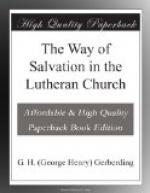Can each one then tell whether he is at present in a converted state or not? We answer unhesitatingly, Yes, to a certainty. The inquirer need only look into his heart and see how his sins affect him. Do his sins grieve him? Does he hate them? Does he earnestly long and strive to be rid of them? Does he daily turn to Jesus Christ for forgiveness and strength? If he can answer these questions in the affirmative, he has the elements and evidences of conversion and the new life. Though faith be weak, it is accepted. Though assurance at times be dim, the vision of faith clouded, and faith itself almost unconscious, it still saves; for it is not the assurance, but the faith, that justifies.
But if, on the other hand, his sins do not trouble the sinner; if they are as trifles to him; if they do not daily drive him to the Cross, the elements and evidences of the new life are certainly wanting. Such a person is in an unconverted state. And let not such an one delude himself with the false idea that something, which he called a change, had taken place at some time in the past. He can know whether he is now in the faith.
It is poor theology, it is altogether anti-scriptural, for a Christian to go through the world singing plaintively:
“Tis a point I
long to know;
Oft
it causes anxious thought,
Do I love the
Lord, or no?
Am
I His, or am I not?”
He whose faith, reaching up out of a heart that mourns over and hates sin, lays hold of Christ, even tremblingly, can say, “I know in whom I have believed,” “I know that my Redeemer liveth.” He can joyfully sing:
“I know that my
Redeemer lives!
What comfort this
sweet sentence gives!
He lives, He lives,
who once was dead,
He lives, my ever-living
Head.
“He lives to bless
me with His love,
He lives to plead
for me above,
He lives my hungry
soul to feed,
He lives to help
in time of need.
“He lives to silence
all my fears,
He lives to wipe
away my tears,
He lives to calm
my troubled heart,
He lives all blessings
to impart.
“He lives, all glory to His Name!
He lives, my Jesus, still the same;
Oh the sweet joy this sentence gives,
I know that my Redeemer lives!”
CHAPTER XX.
CONVERSION—HUMAN AGENCY IN
What part and responsibility pertain to the human will in this matter?
Before we leave the subject of conversion, it is important that we consider and understand this question also. For on this point also grievous and dangerous views and practices prevail. Human nature tends to extremes. Here too, there is a tendency to go too far, either in the one direction or the other. There are those, on the one hand, who virtually and practically make this change of heart and of nature a human work. They practically deny the agency of the Holy Spirit, or His means of Grace. On the other hand, there are those whose ideas and teachings would rid man of all responsibility in the matter, and make of him a mere machine, that is irresistibly moved and controlled from above.




